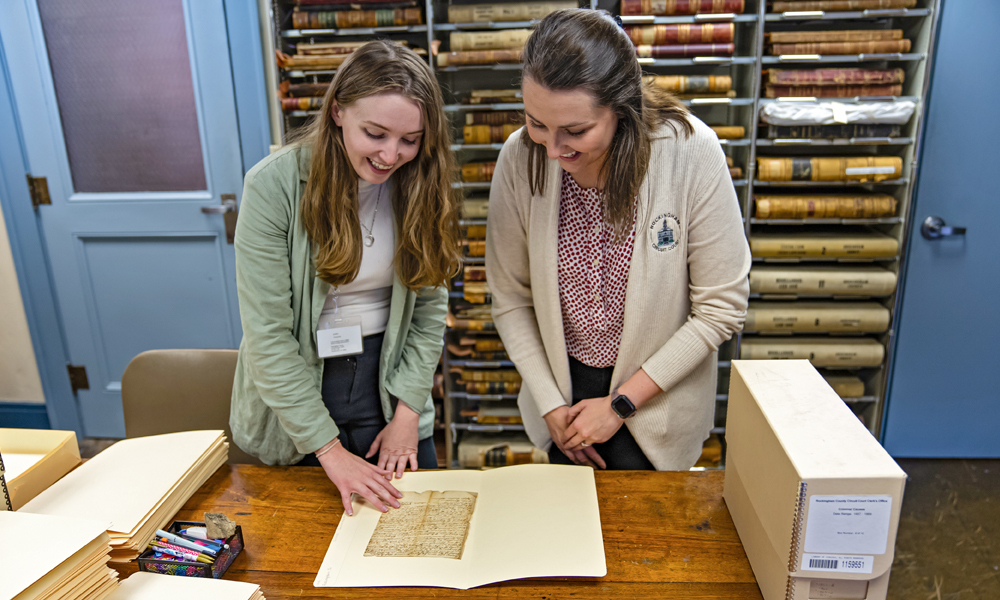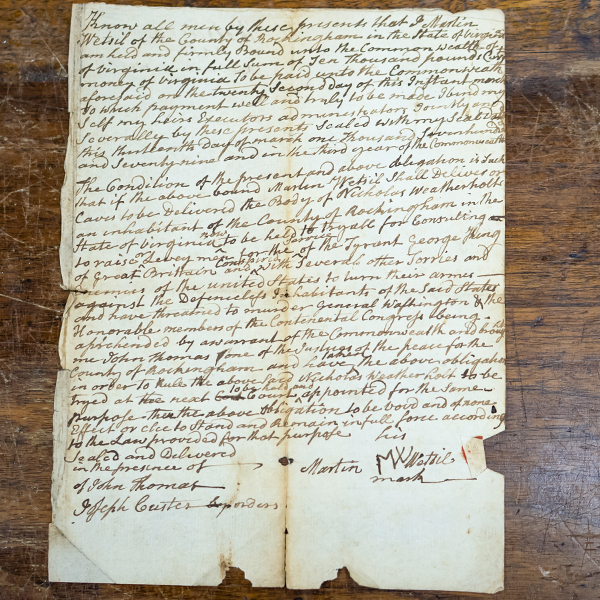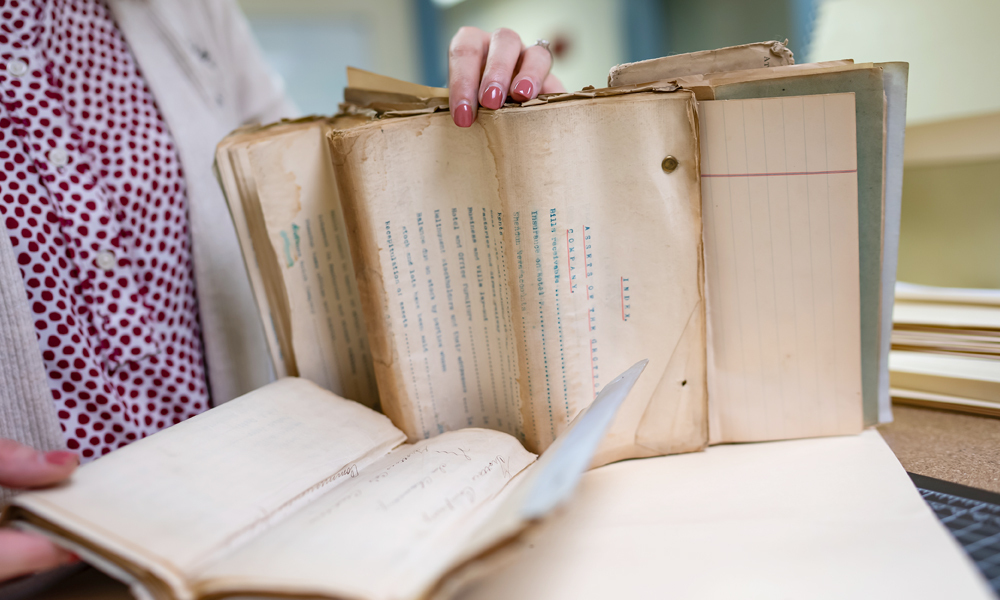History students rediscover alleged local plot to kill George Washington
JMU Headlines
SUMMARY: A bond agreement dated March 13, 1779, ensuring the accused’s appearance in court was recently uncovered in the annals of the Rockingham County Courthouse. The discovery is one of a series of stories being published by the local circuit court under the name “True Crime in the Shenandoah Valley.”
Hear more episodes and subscribe to the podcast at the Being the Change podcast page.
In 1779, Gen. George Washington was intent on countering an imminent British offensive, maintaining control of the Hudson River, and protecting critical Continental Army resources. In January of that year, he met with members of the Continental Congress in Philadelphia to discuss strategy.
Meanwhile, 300 miles away, in Rockingham County, Virginia, Nicholas Weatherholt, an immigrant of German heritage who remained loyal to the British crown, was allegedly hatching a plan of his own — to assassinate Washington and federal lawmakers.

A bond agreement dated March 13, 1779, ensuring that Weatherholt appear in court during the May term to stand trial “for Consulting to raise or Levy men for the service of the Tyrant George King of Great Britain and conspire with several other Torries [sic] and enemies of the United States … to murder General Washington and the Honorable members of the Continental Congress,” was recently uncovered in the annals of the Rockingham County Courthouse.
Three JMU History graduate assistants were sorting and digitizing historical court records for an online archiving project, Histories Along the Blue Ridge, which is managed by JMU Libraries.
Megan Schoeman (’18, ’23M), deputy clerk of court for Rockingham County, came across the agreement, which was secured by a payment of “ten thousand pounds” by local resident Martin Wetsil, in a bundle of papers clipped together in a folder.

“I was thrilled,” she said. “As historians, we don’t think of the Shenandoah Valley frontier as being a major contributor to the American Revolution. We certainly don’t see a lot of Tories — supporters of the king — mentioned.”
Annette Guild (’23M), who was working alongside Schoeman at the time, said her “face changed” and her eyes “got big” when she realized what she had found.
|
“As historians, we don’t think of the Shenandoah Valley frontier as being a major contributor to the American Revolution. We certainly don’t see a lot of Tories — supporters of the king — mentioned.” — Megan Schoeman (’18, ’23M), deupty clerk of court |
Because of a disability that prevented him from joining his fellow graduate assistants on site, Thomas Kidd (’21, ’23M) was tasked with drafting stories about the team’s findings and publicizing its work.
“We immediately recommended to Thomas that he write about this document, and I started making digital copies,” Guild said.
Kidd said he was surprised that “such a big thing in our nation’s history was connected to the Rockingham County area.”
According to Guild, Weatherholt was born in the Alsace region of France to German parents and in 1754 sailed to America on a ship with his wife and brother, initially settling in Pennsylvania. He enlisted as a captain in the British army and served in the French and Indian War, where he undoubtedly became aware of a young colonel named George Washington. Weatherholt and his family relocated to the Shenandoah Valley in 1773, five years before Rockingham County received its charter from the state of Virginia and six years before he was arrested for planning to kill Washington.
Schoeman said court records from the 1930s contain references to the case, Commonwealth v. Weatherholt, but little is known about the accused’s fate.
“We are reintroducing this local history to the public as we look further into this story,” she said.

During the Spring 2023 semester, the students pored over courthouse records dating to the late 18th century as well as boxes of local records supplied by the Library of Virginia in Richmond.
“We spent many hours sorting through the documents, trying to accurately describe them, and then many more hours on computers scanning them and putting the information into spreadsheets,” said Guild, who chose JMU for graduate school in part because of Histories Along the Blue Ridge and other research opportunities in public history.
|
“We’ve found some really cool stories that will interest a lot of people, as well as documents that will help researchers write more histories about our state and our country.” — Annette Guild (’23M) |
Among the group’s other notable findings were several cases from the 1830s in which freed local slaves were criminally charged for not leaving Virginia within one year.
Guild, who is especially interested in the history of African Americans in the 18th and 19th centuries, uncovered the story of an enslaved girl in nearby Augusta County, Virginia, who was executed for drowning her master’s baby. “She was hanged for that crime, even though some of the townspeople weren’t convinced she was guilty,” Guild said. “On the night of her execution, there were some loud noises that drove people out of their homes that were thought to be her ghost coming back to haunt the town.”
Kidd found documents detailing a “brawl” between members of the local Republican Party, including a commonwealth's attorney, during the 1900 election season.
These stories and more are being posted on Rockingham County Circuit Court Clerk Chaz W. Haywood’s (’97) Facebook page under the series name “True Crime in the Shenandoah Valley.”
The students also examined chancery court cases involving contract disputes, helped repair damaged documents for posterity, and assisted individuals looking to trace their family histories in the valley.
Last year, graduate assistants digitizing records in Augusta County for Histories Along the Blue Ridge discovered the original land grant for Pittsburgh, Pennsylvania.
“We’ve found some really cool stories that will interest a lot of people, as well as documents that will help researchers write more histories about our state and our country,” Guild said. “It’s been great to be a part of.”
